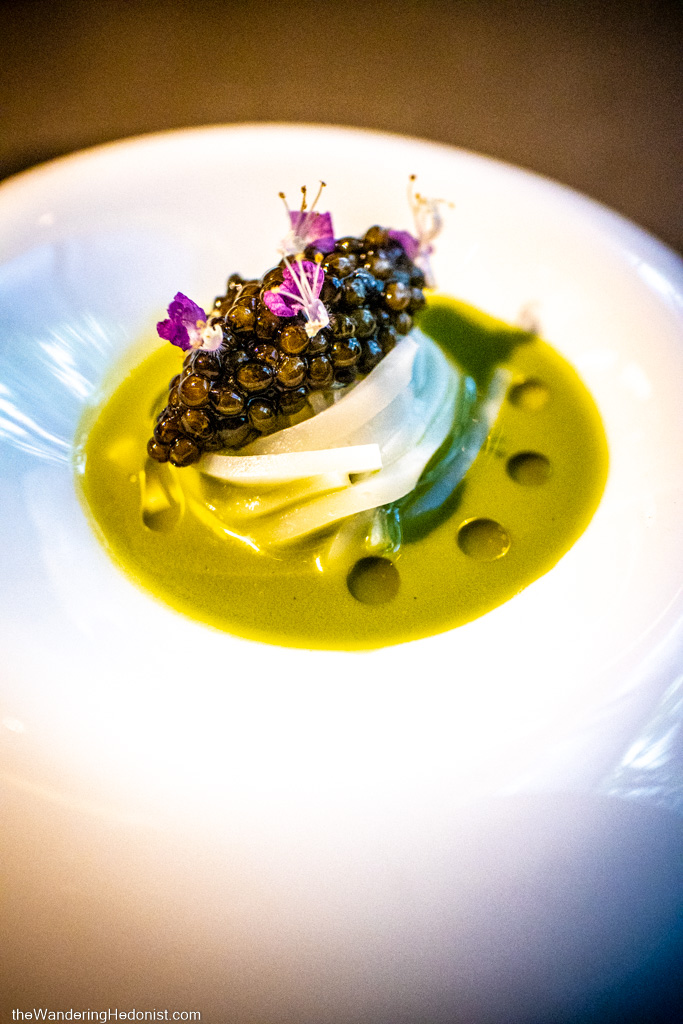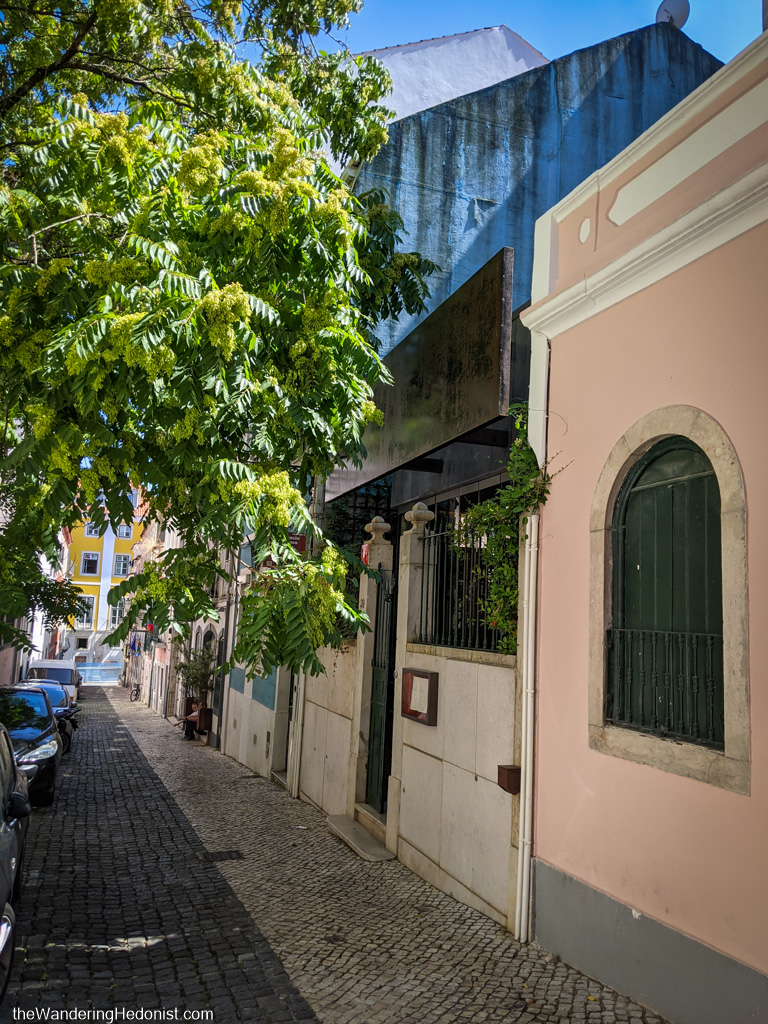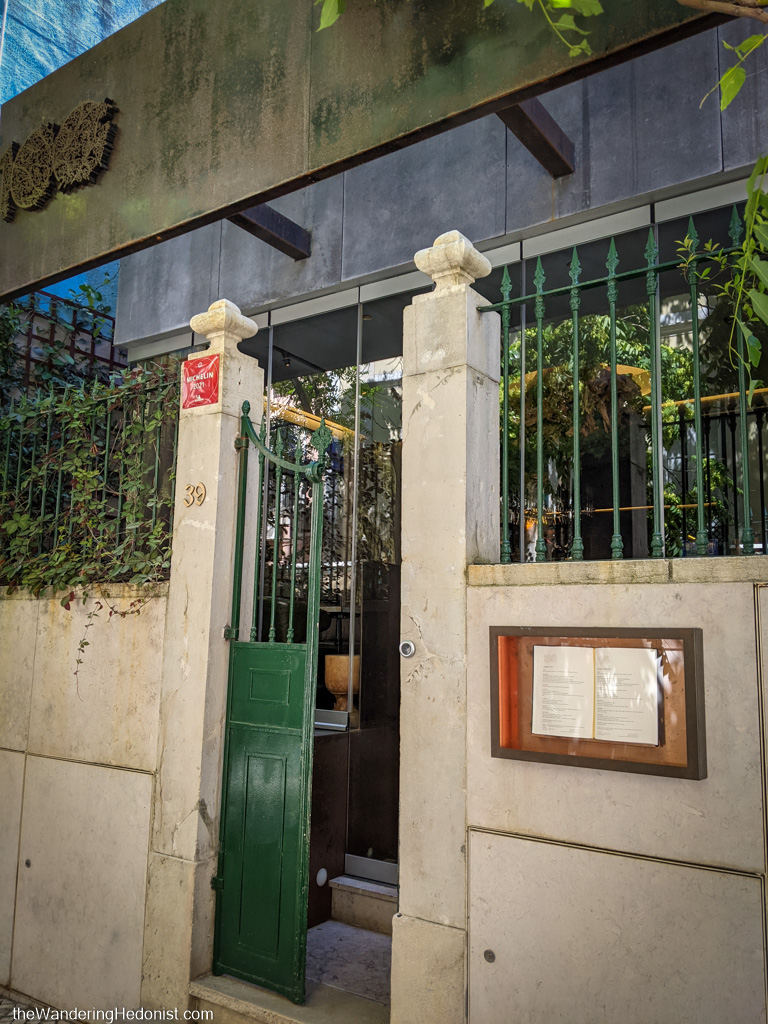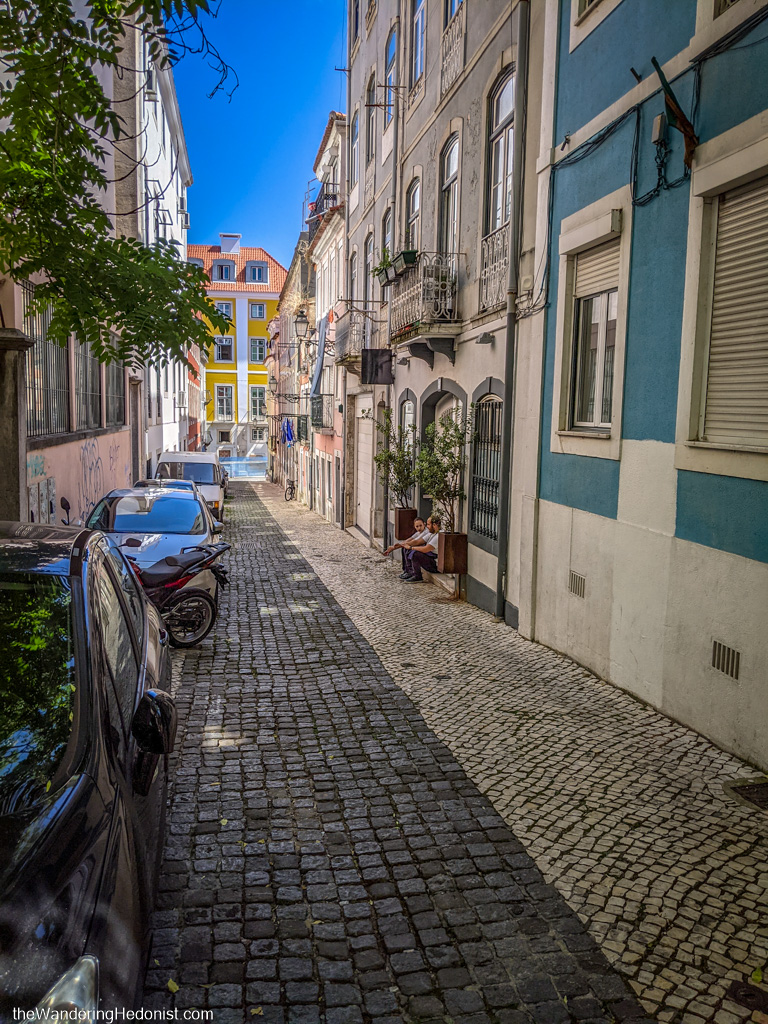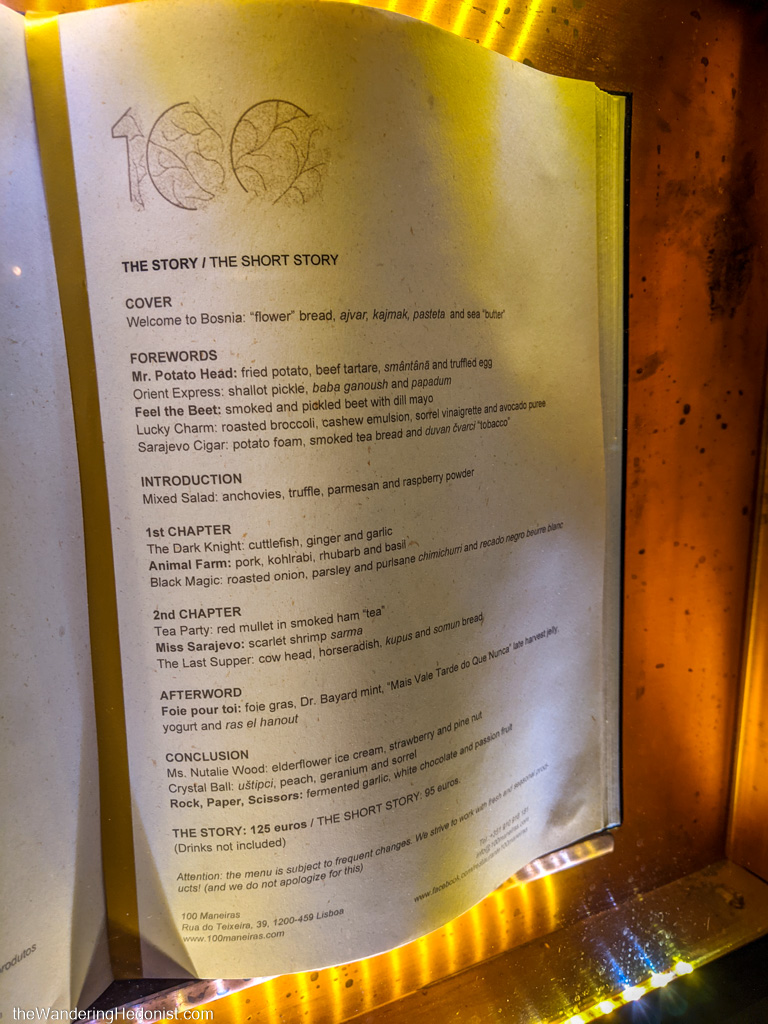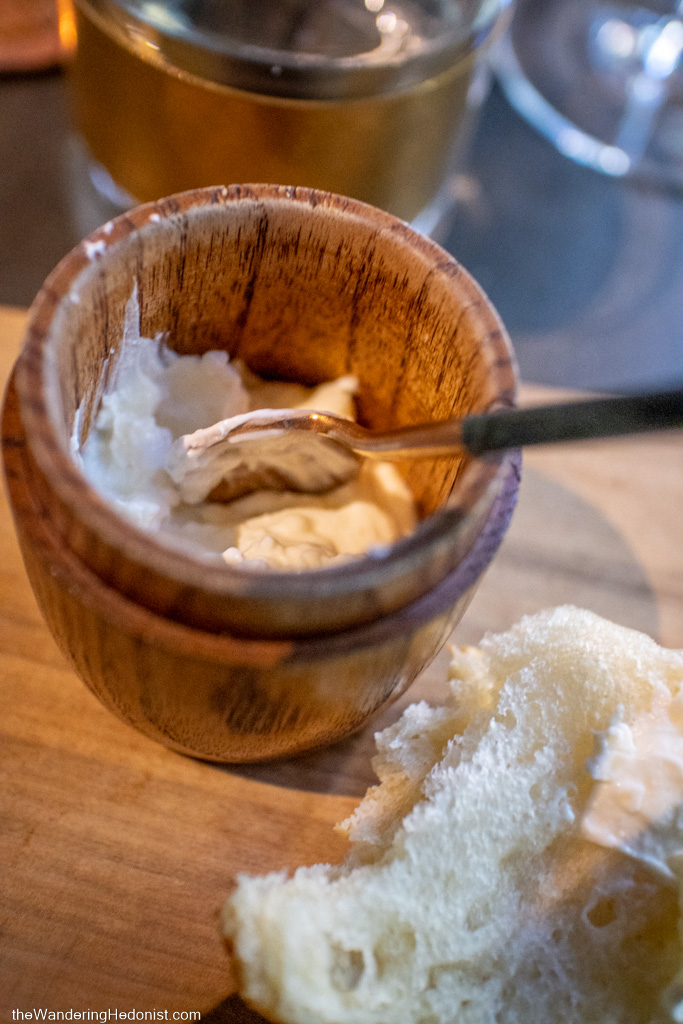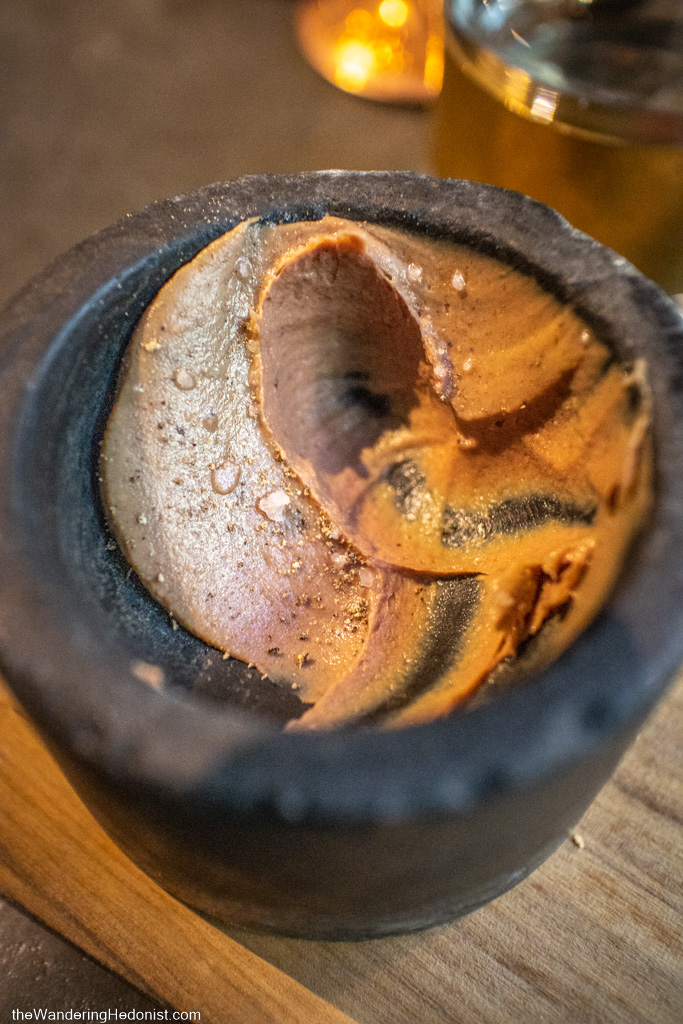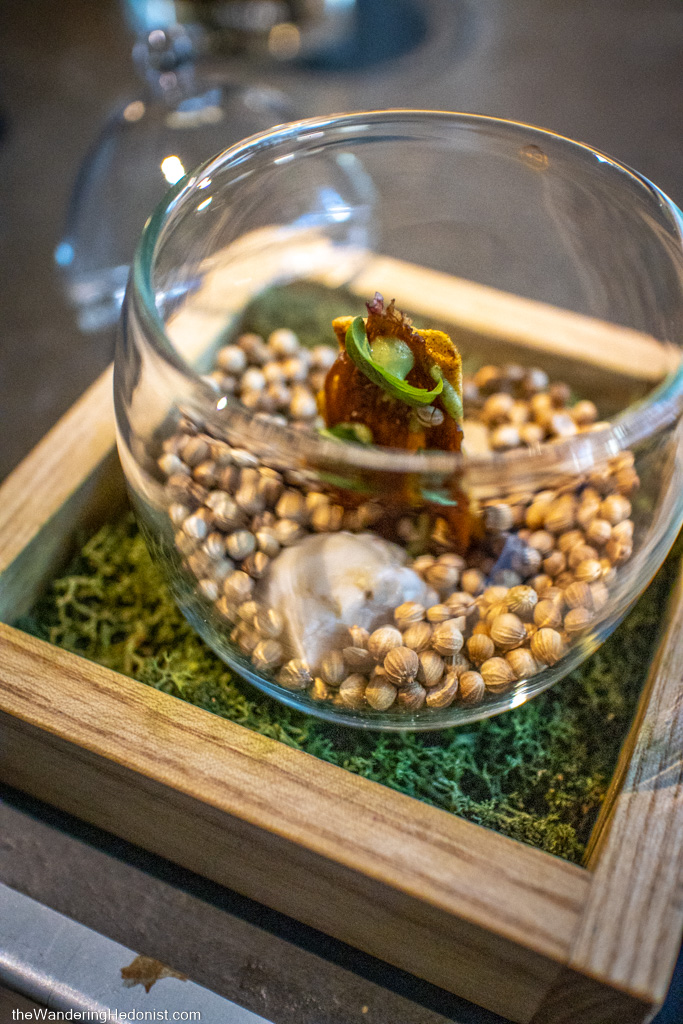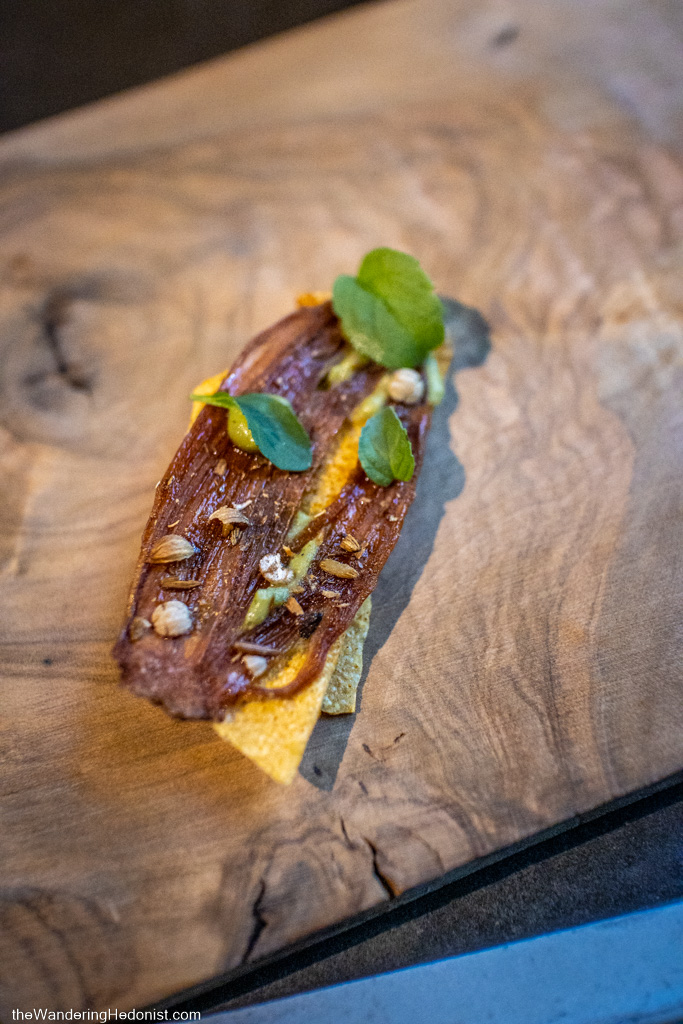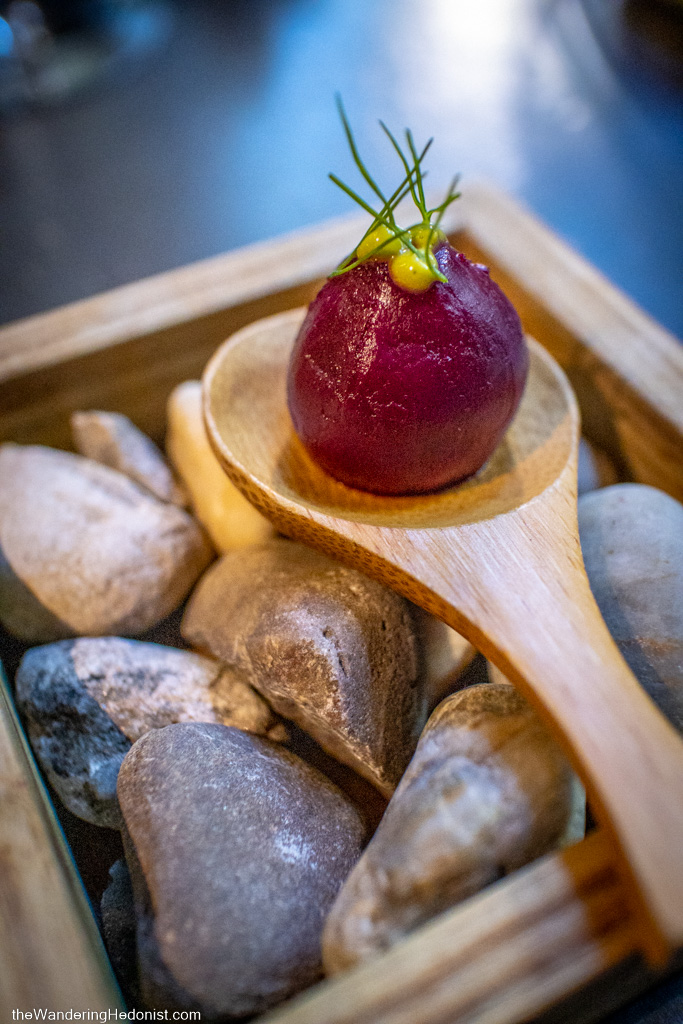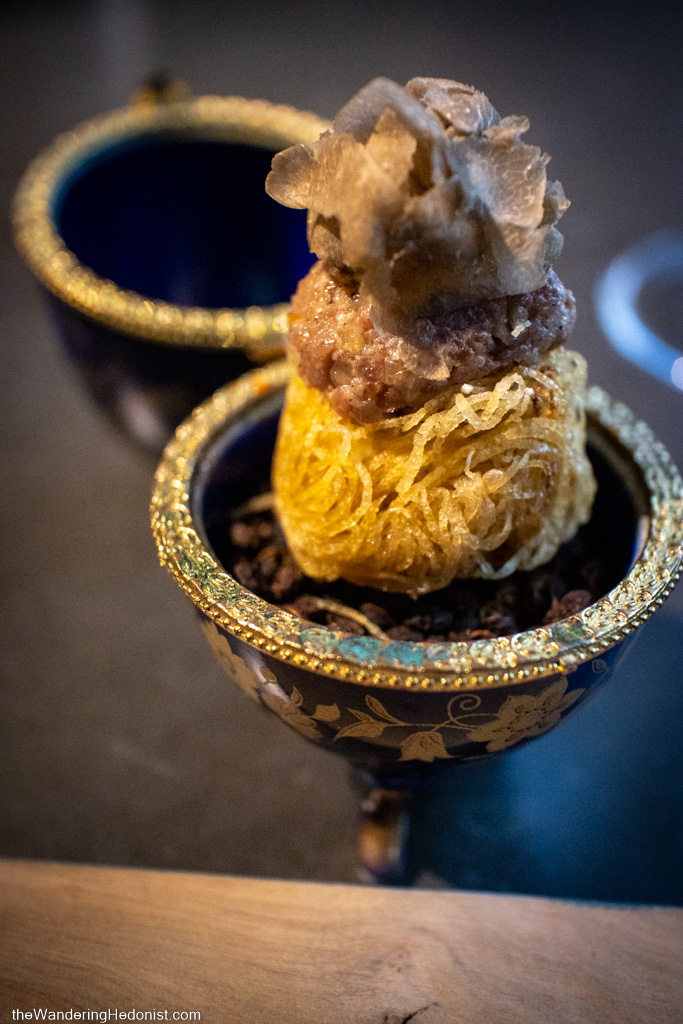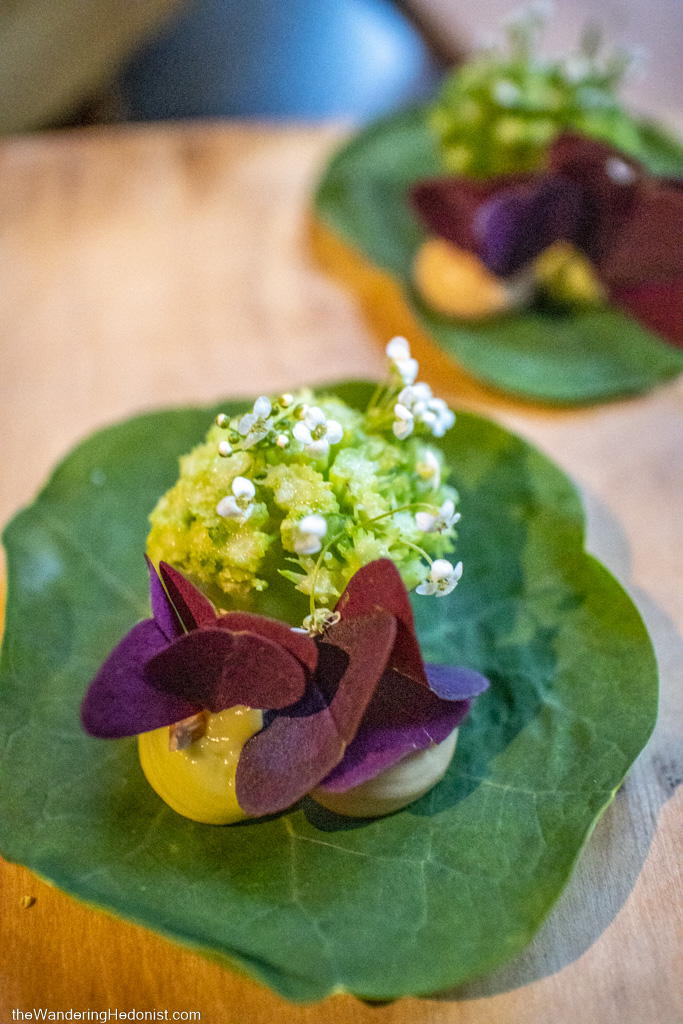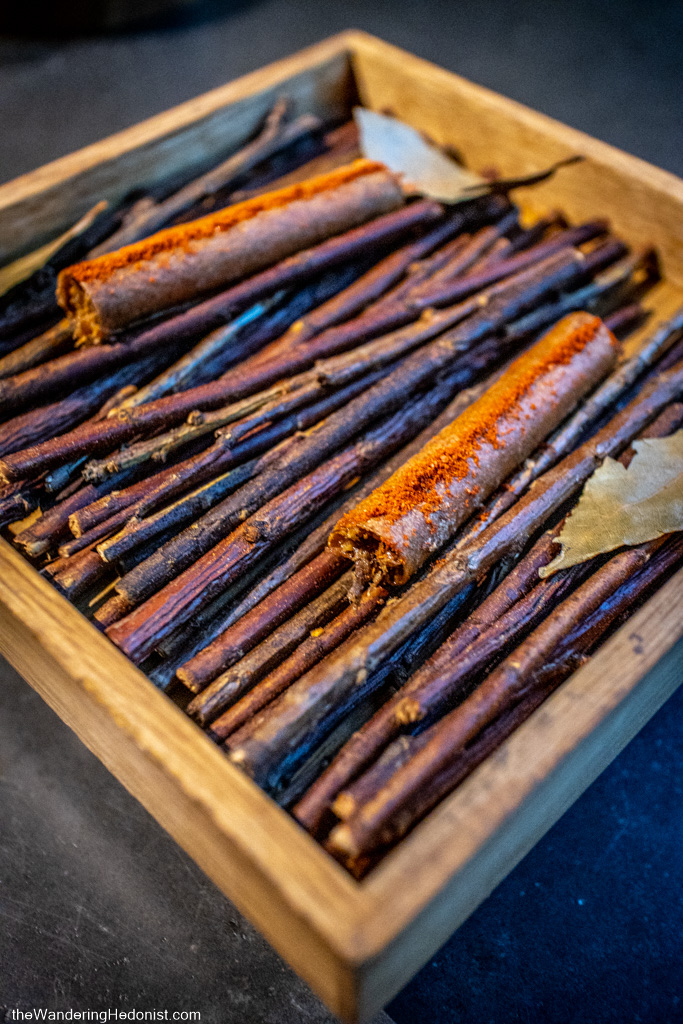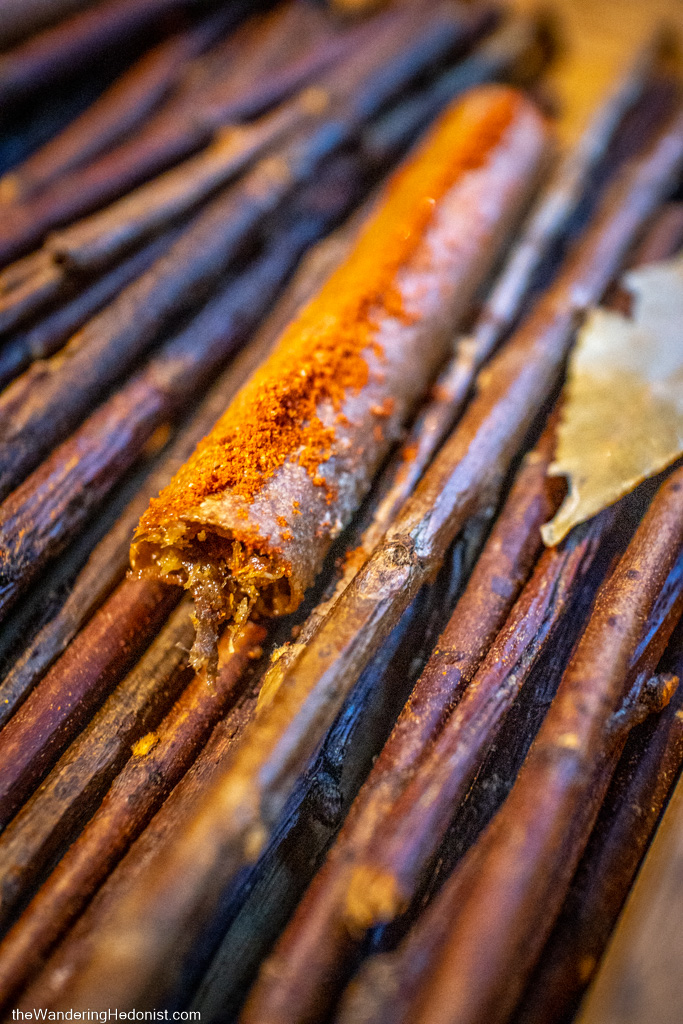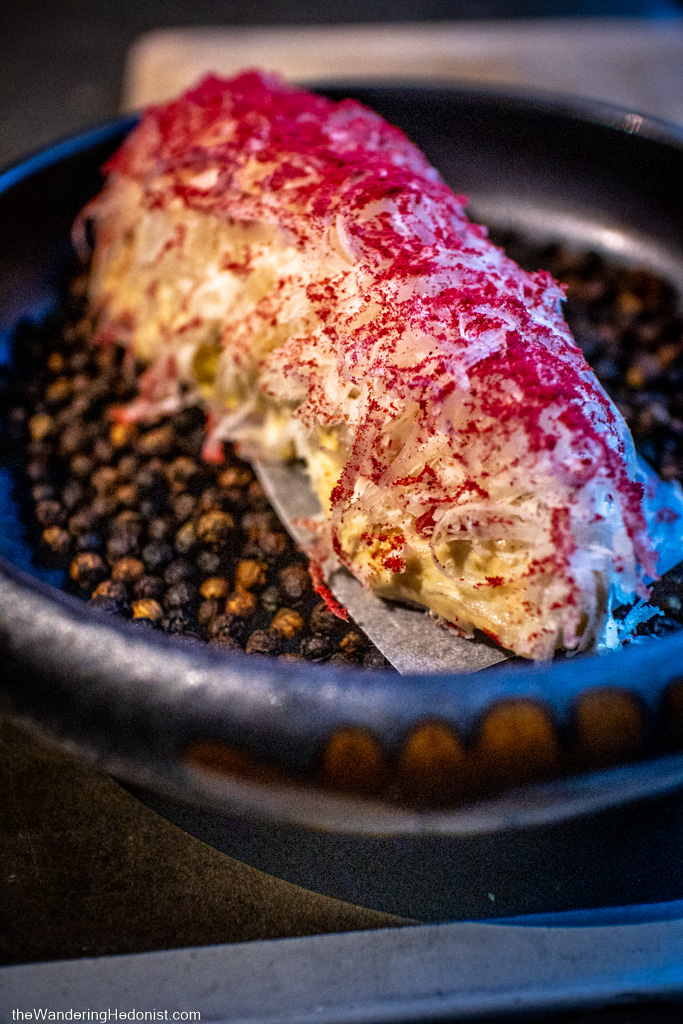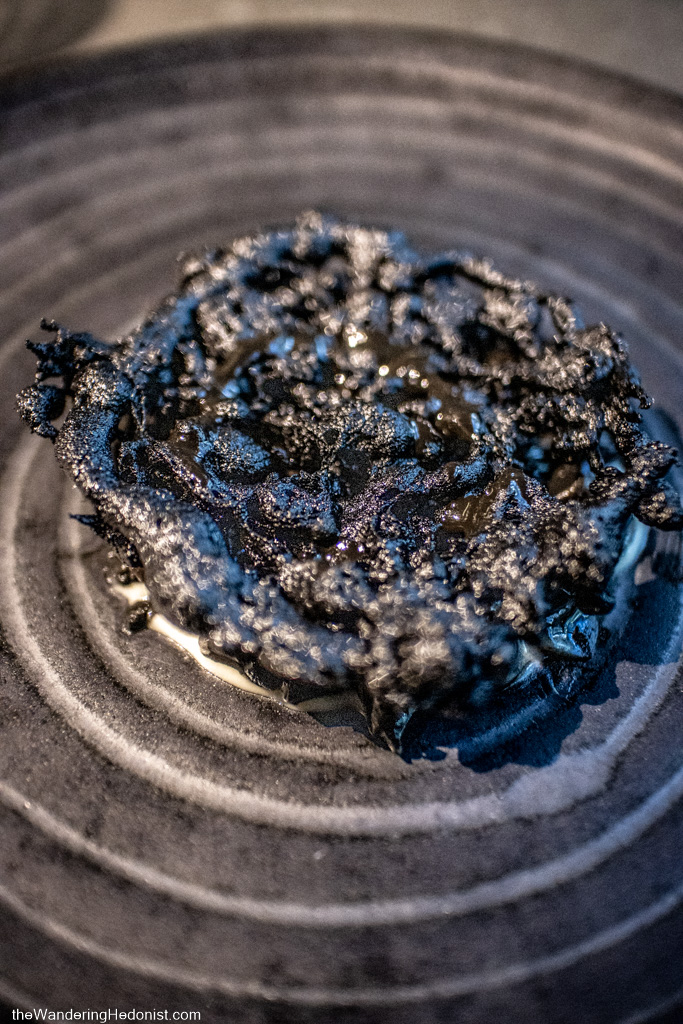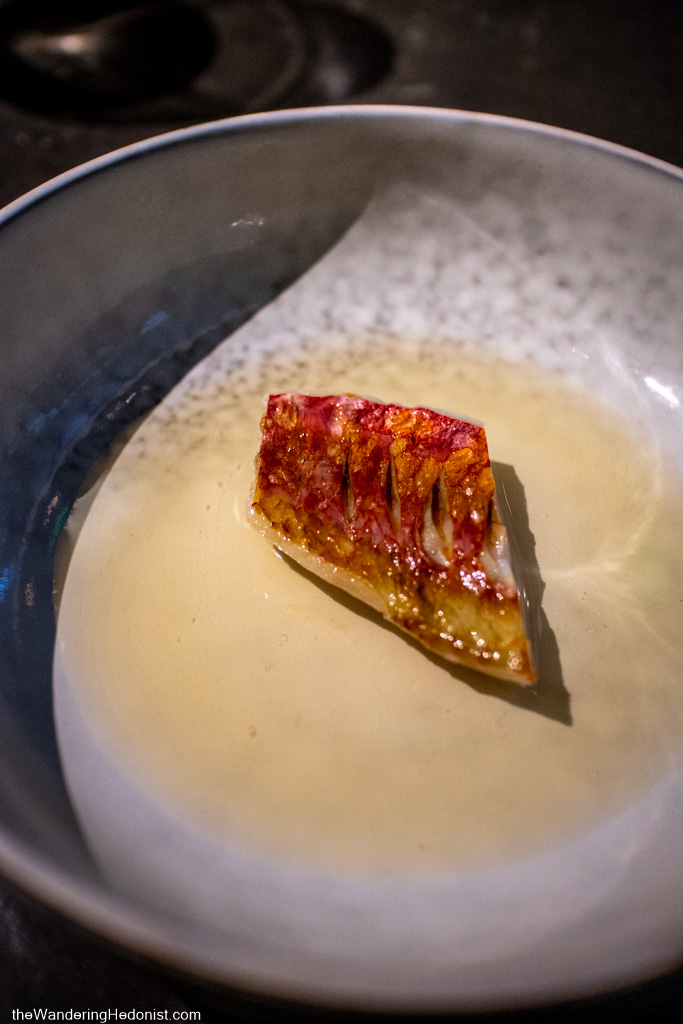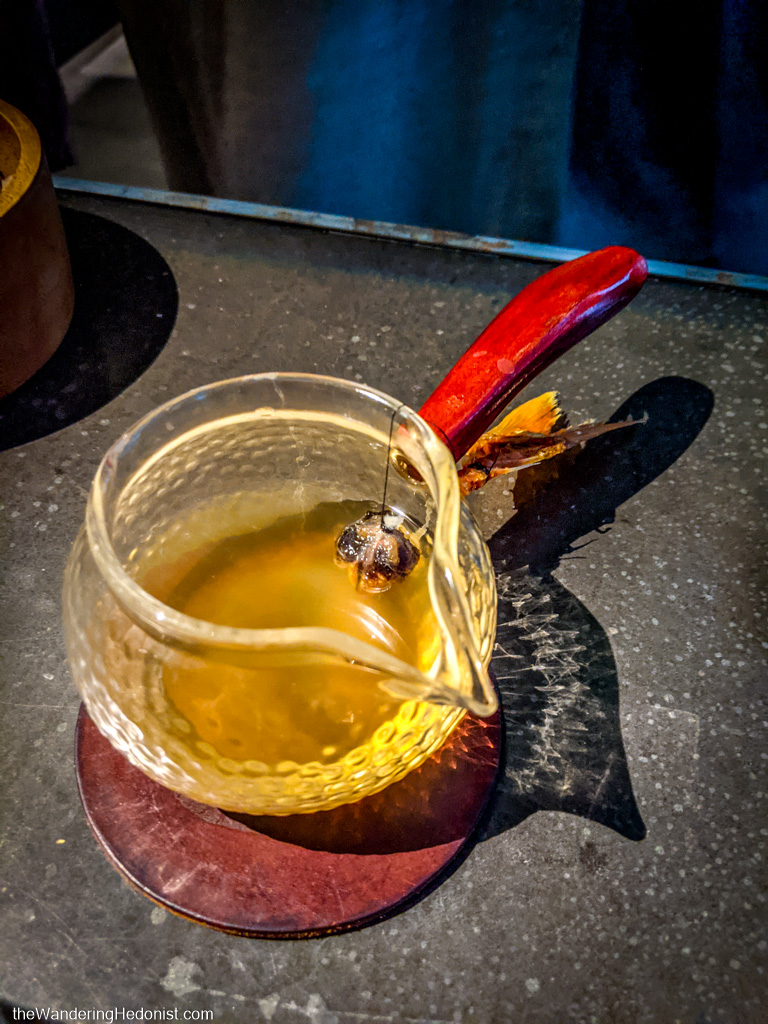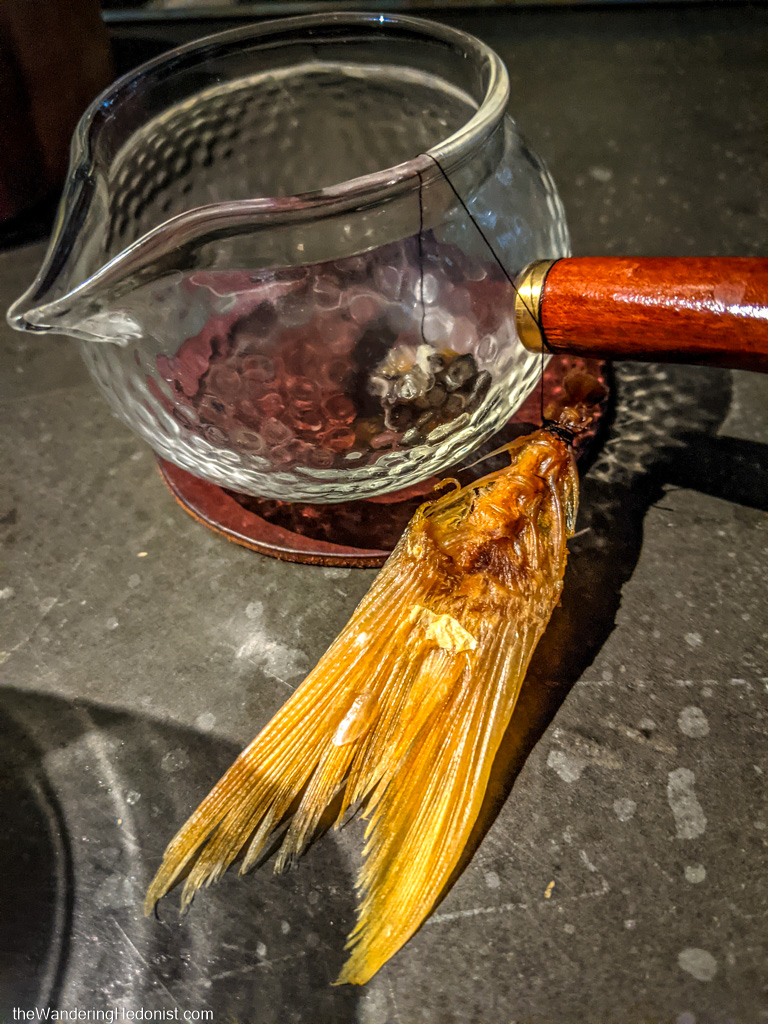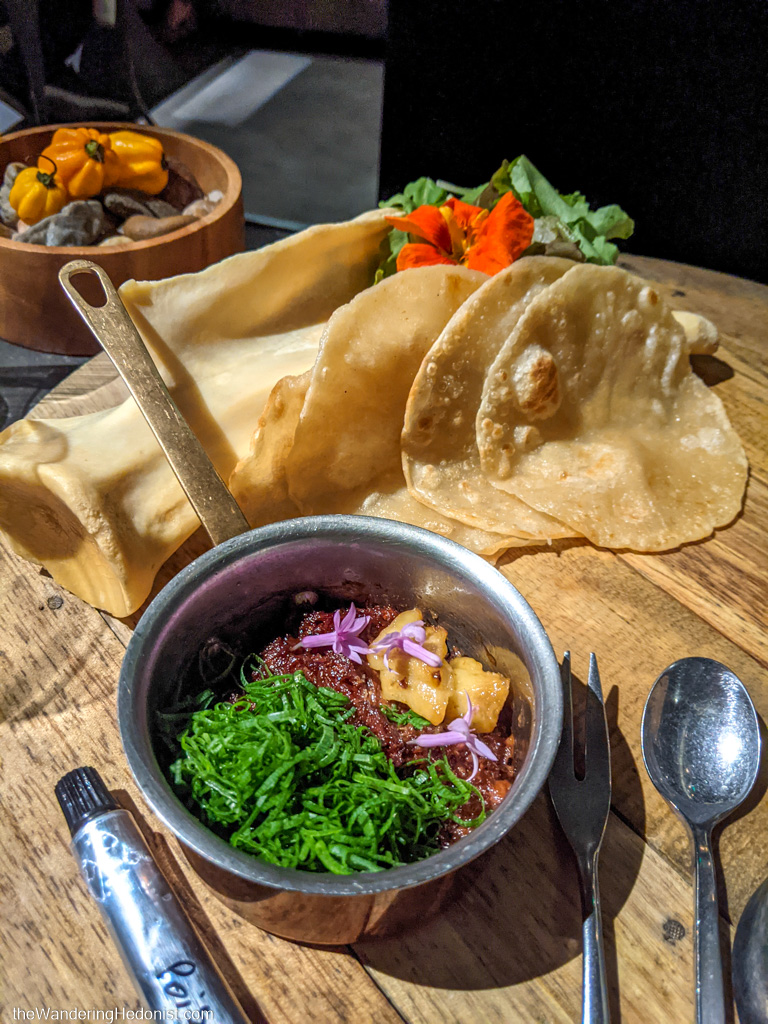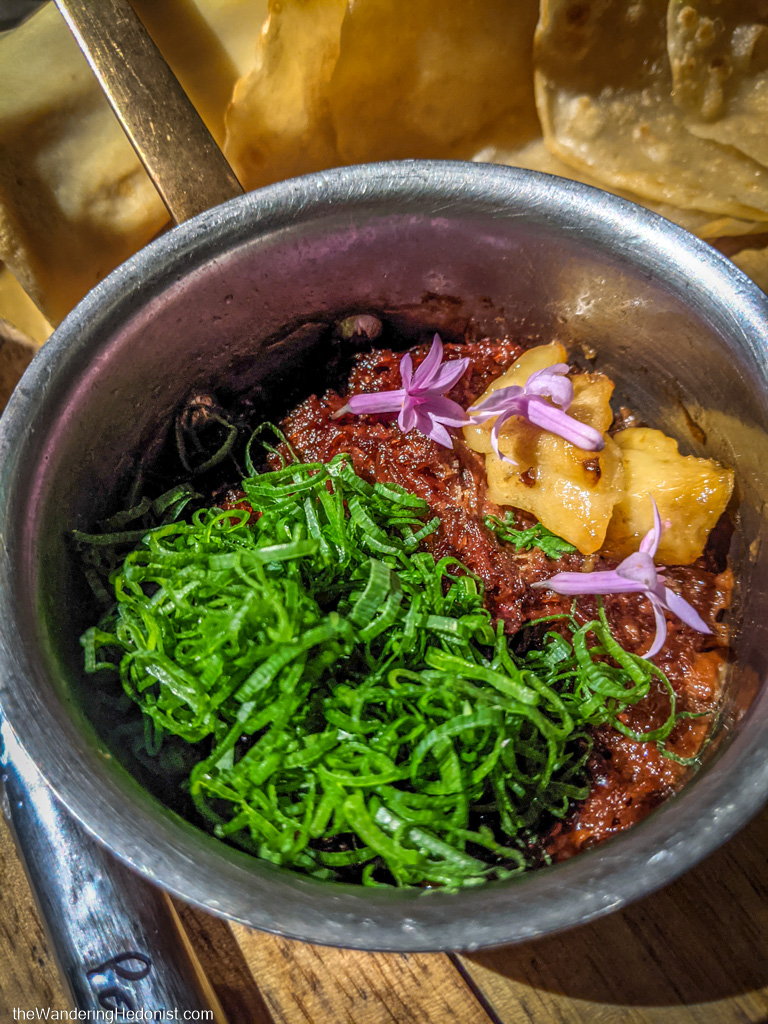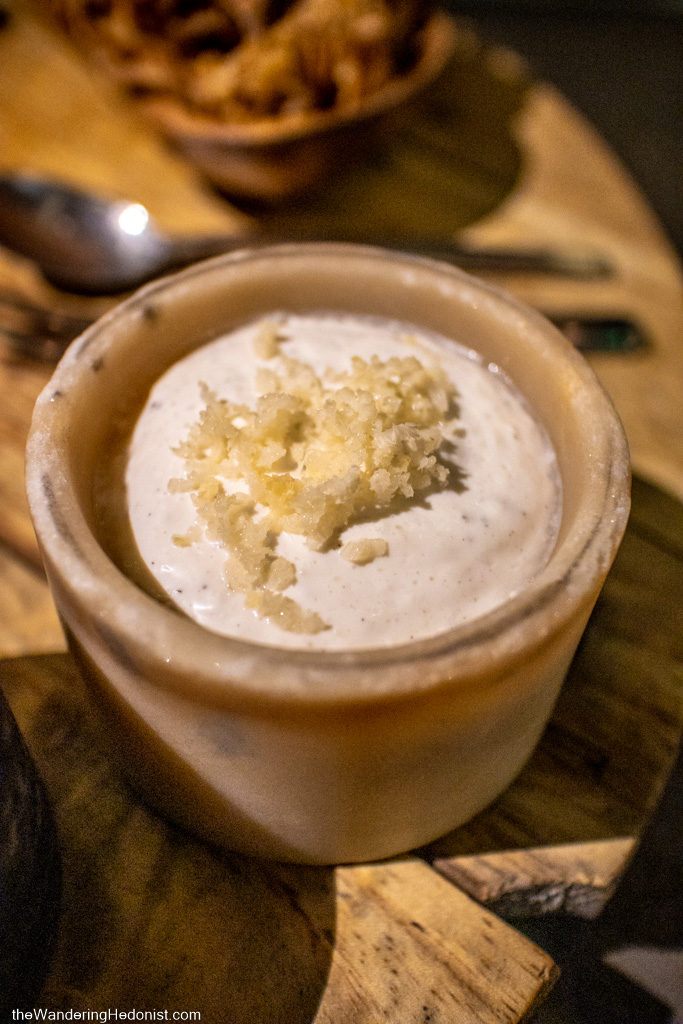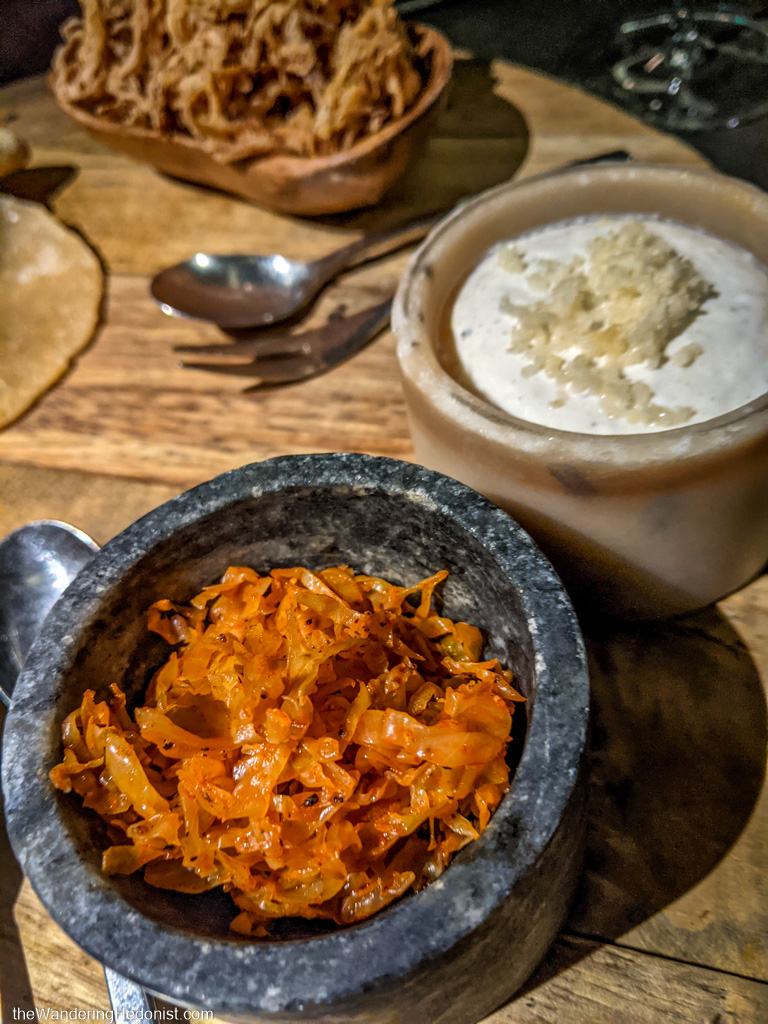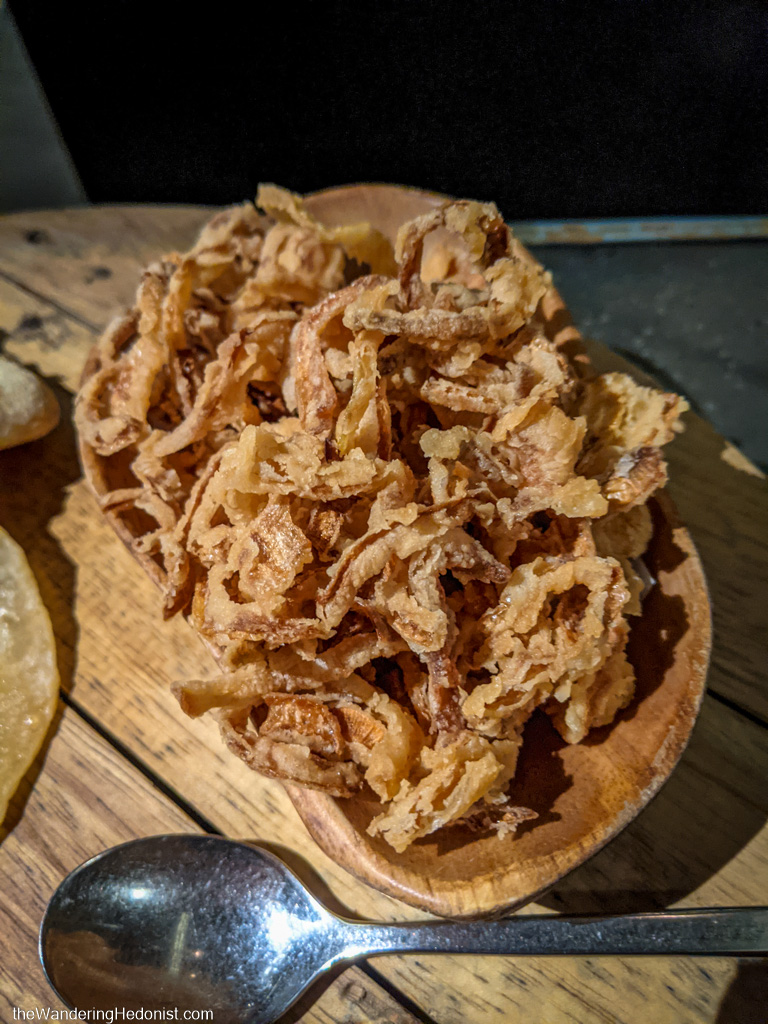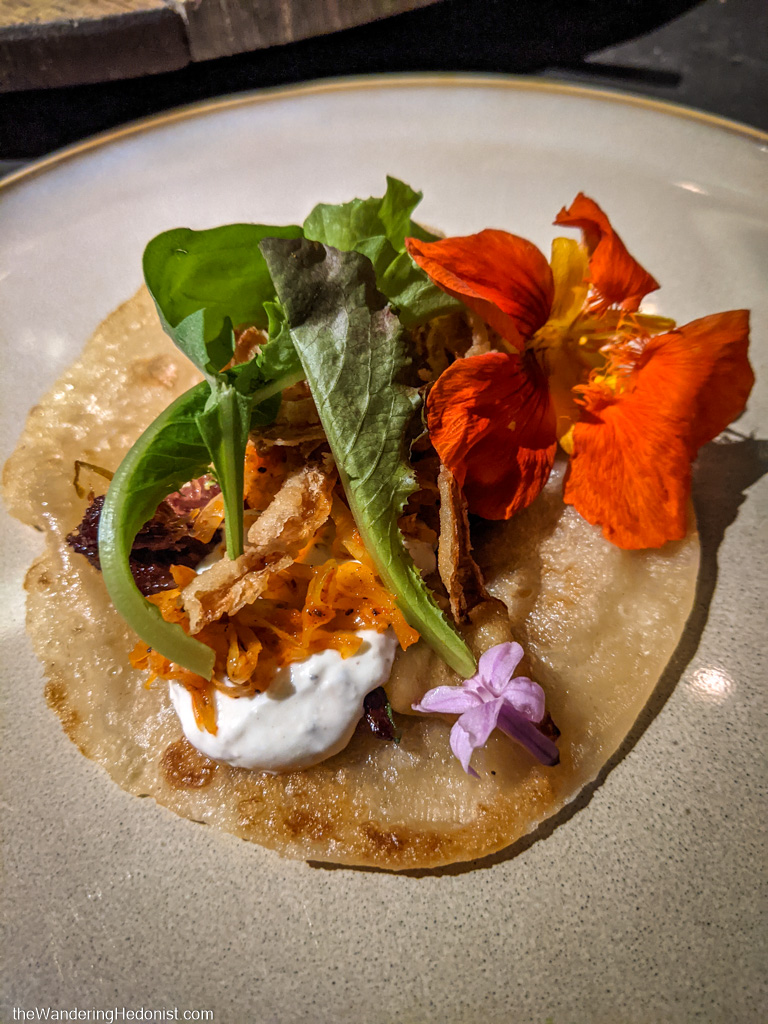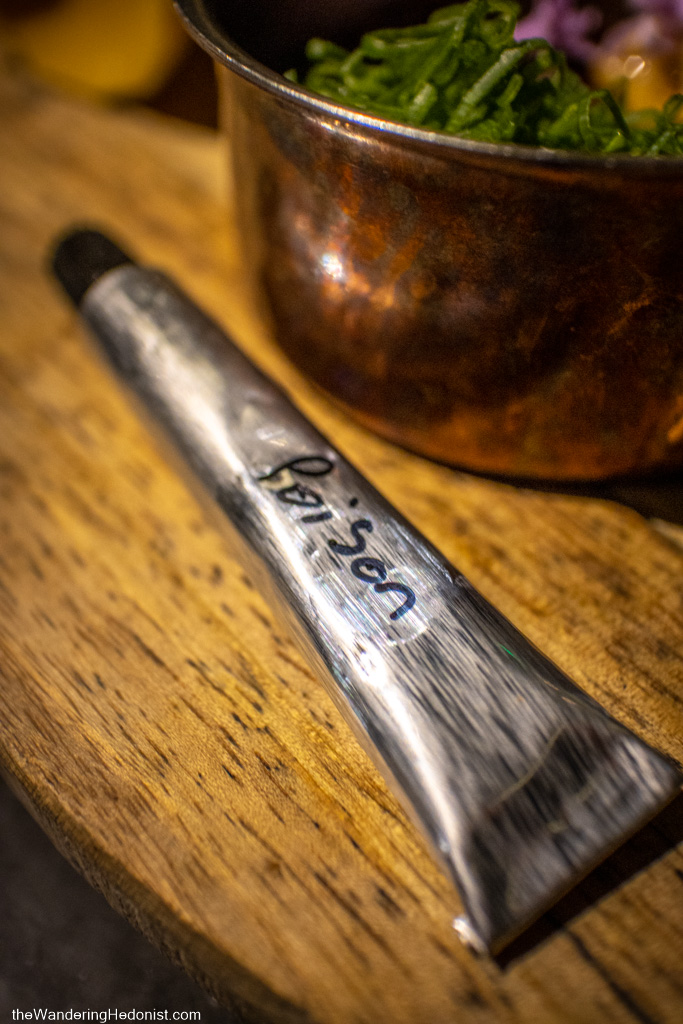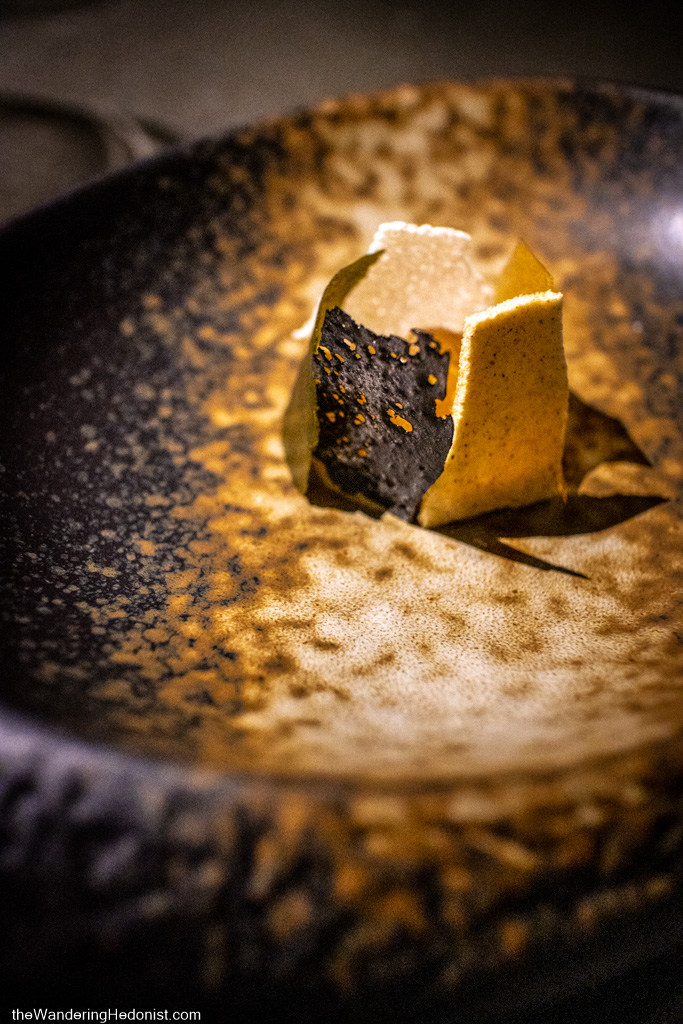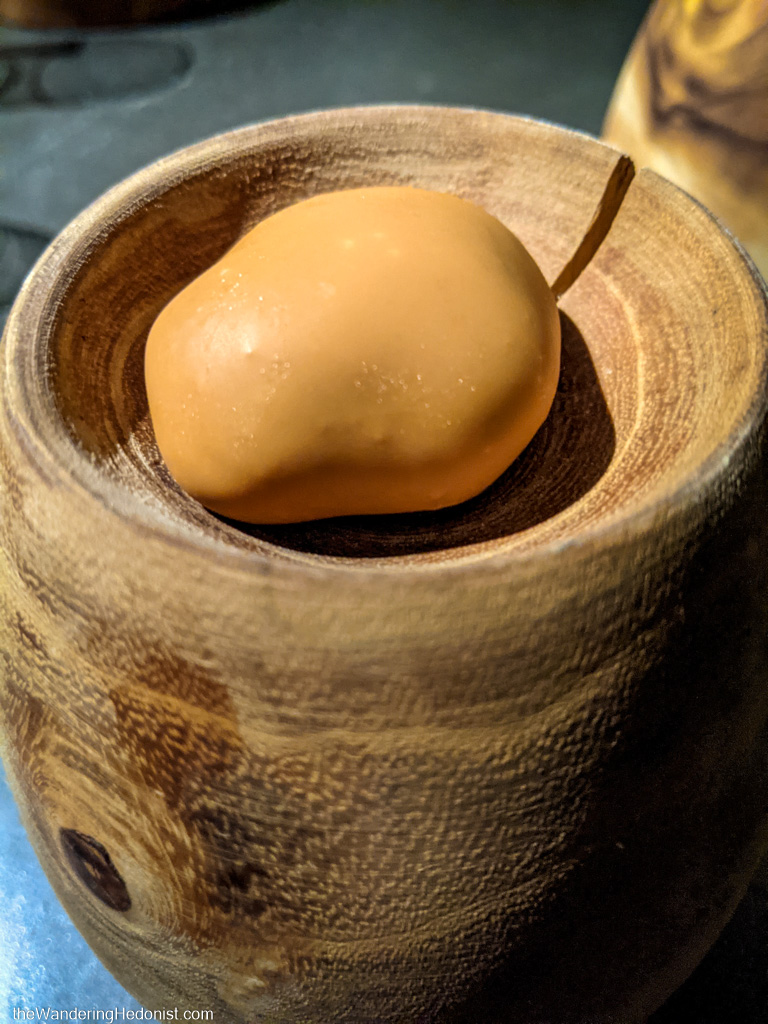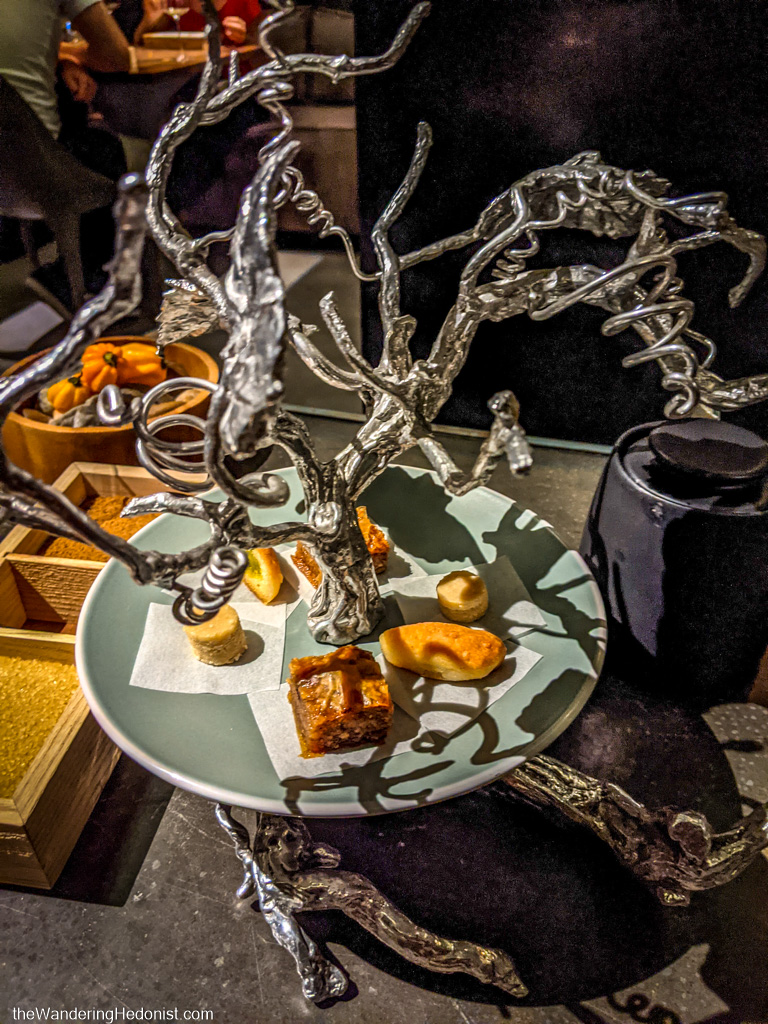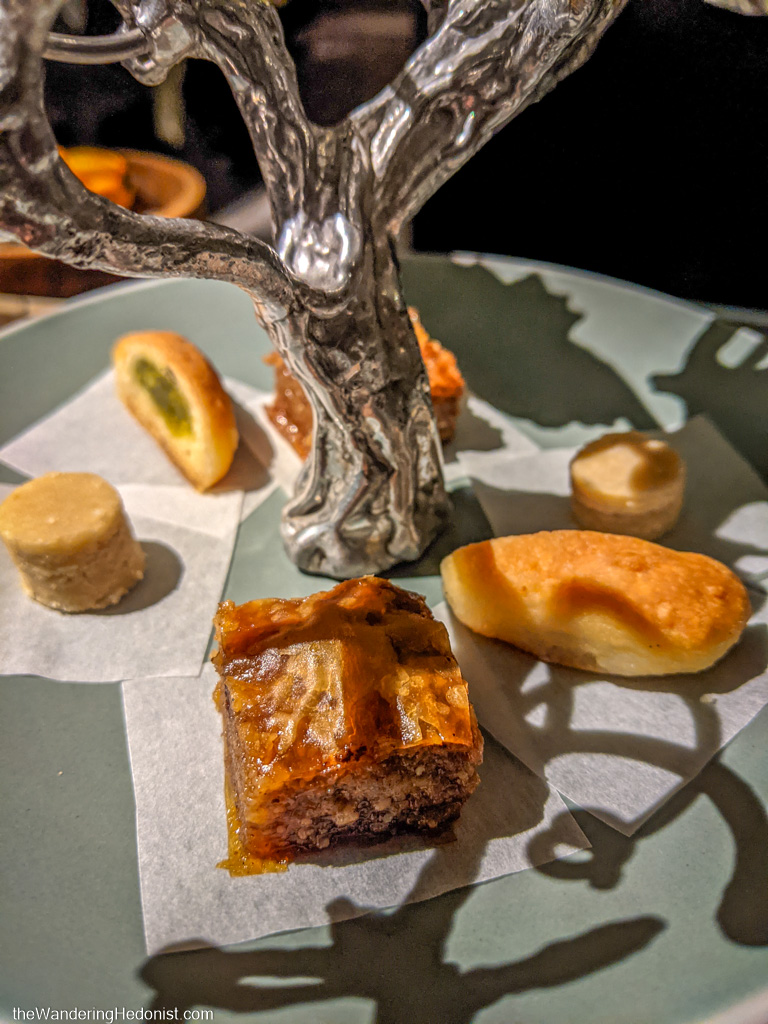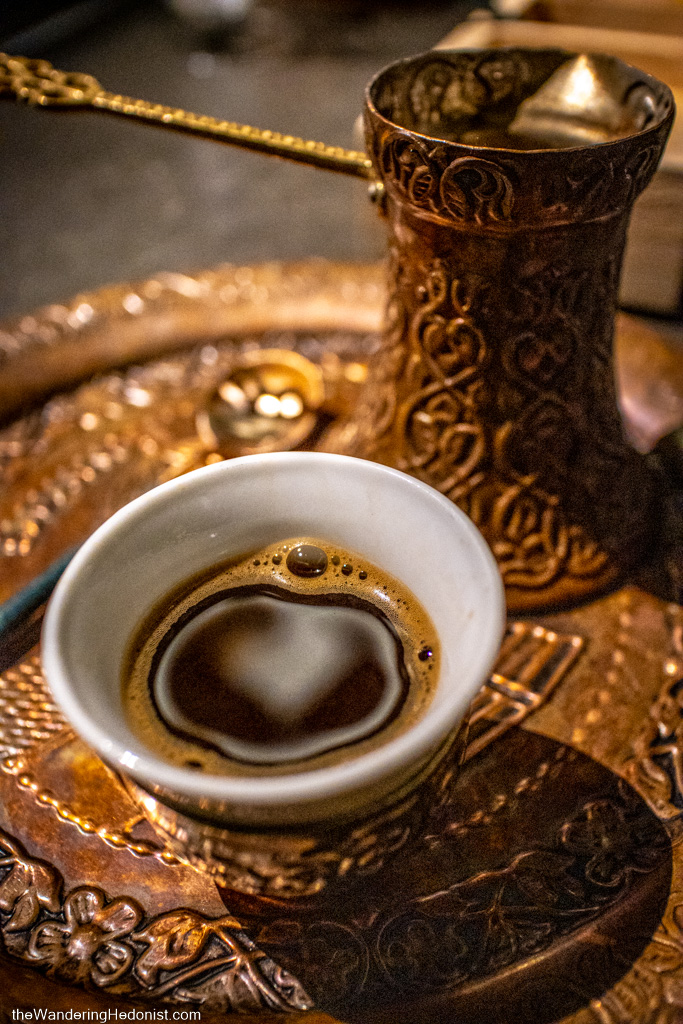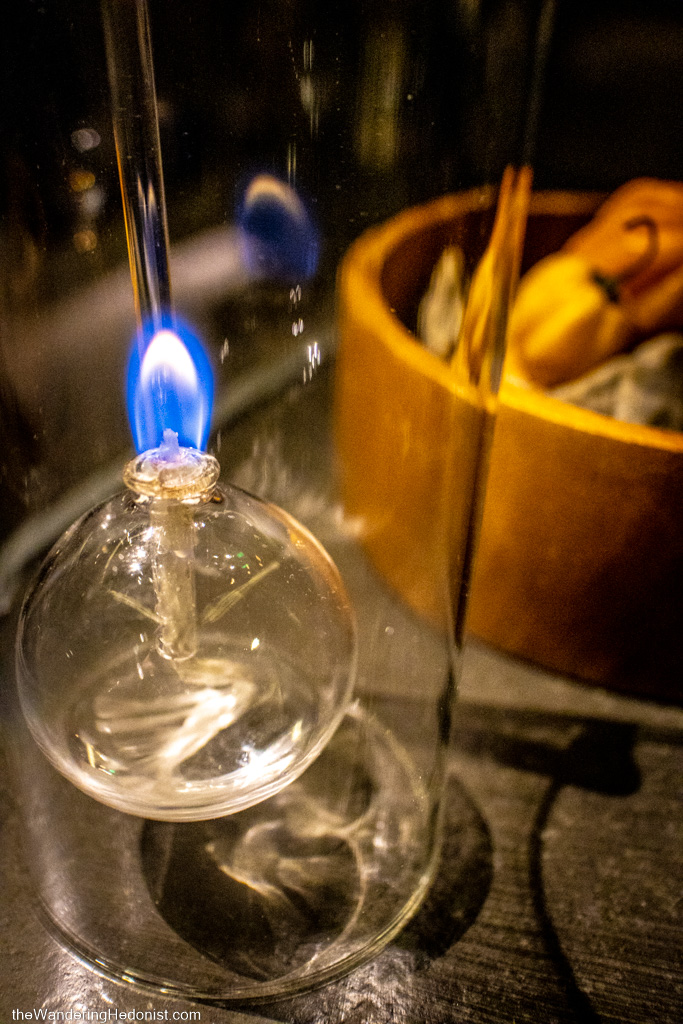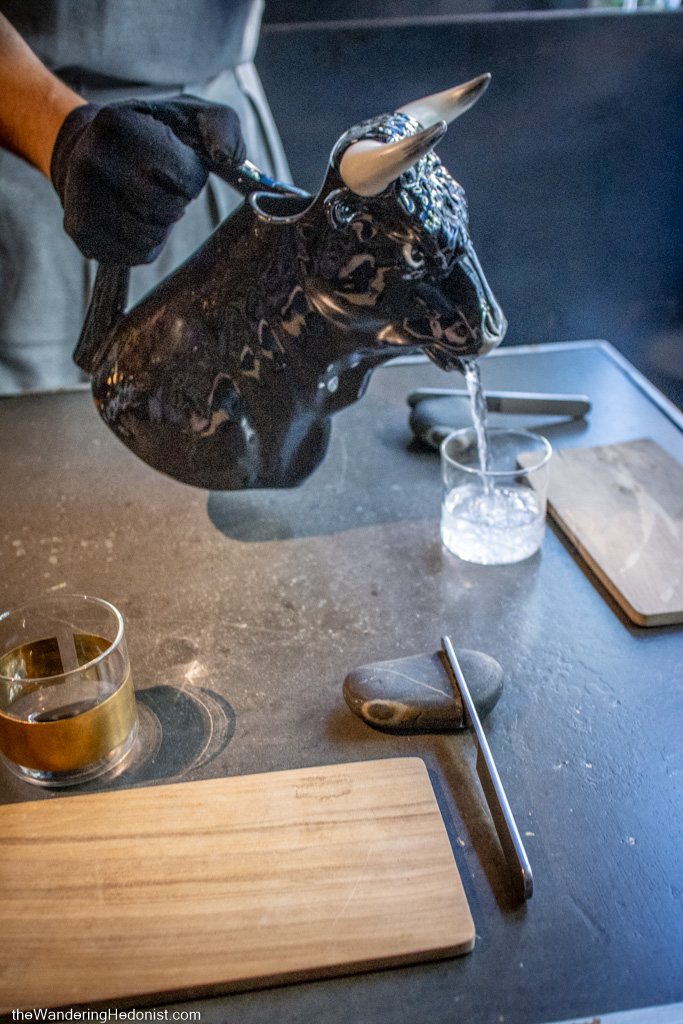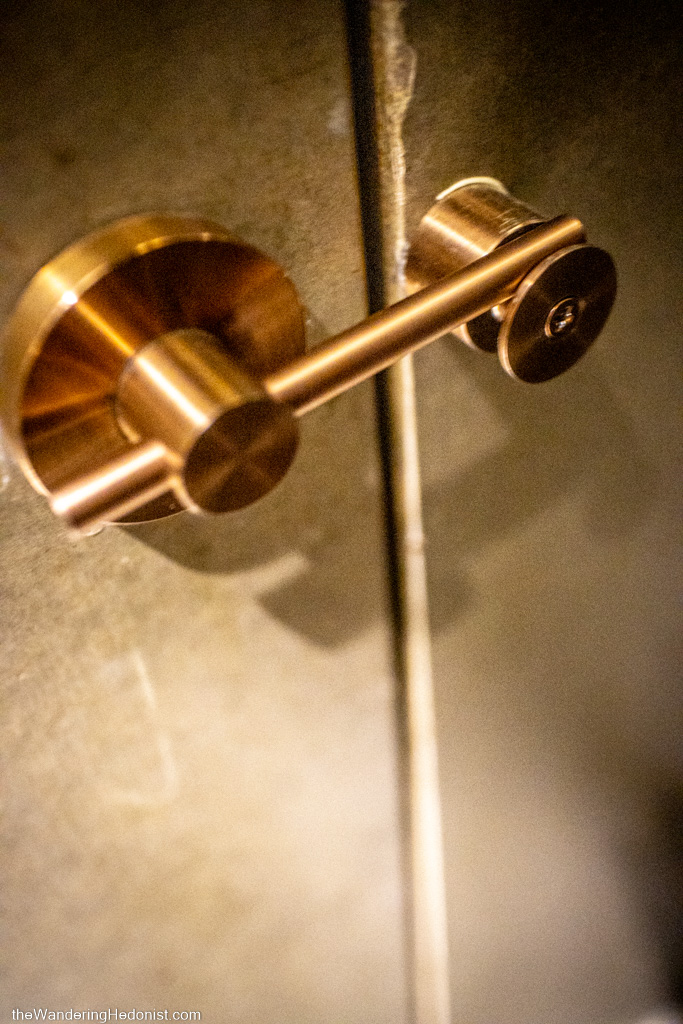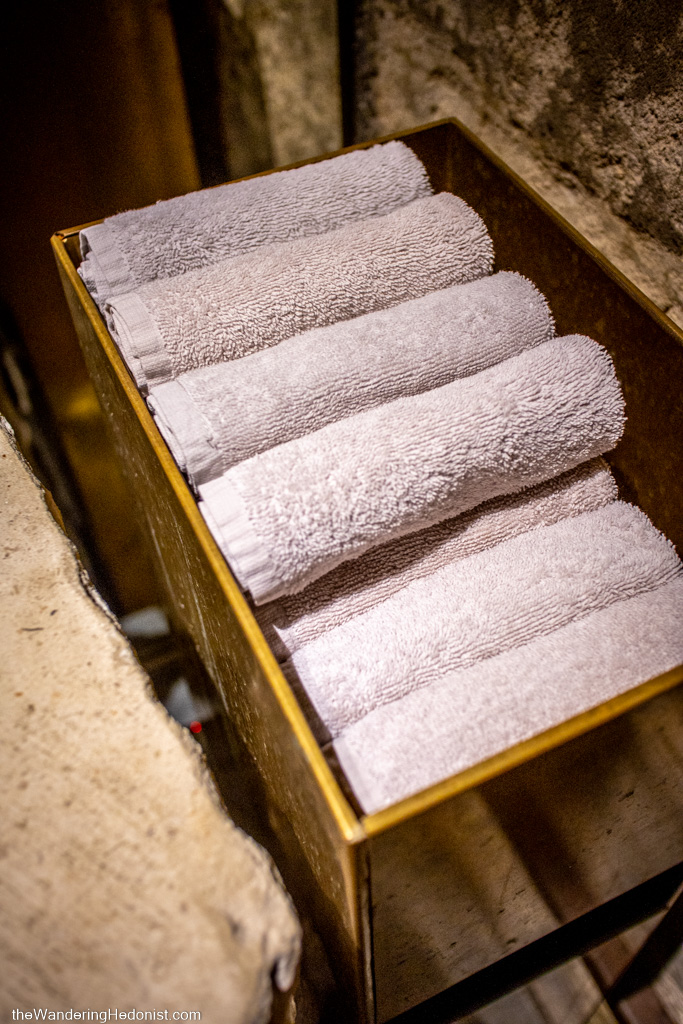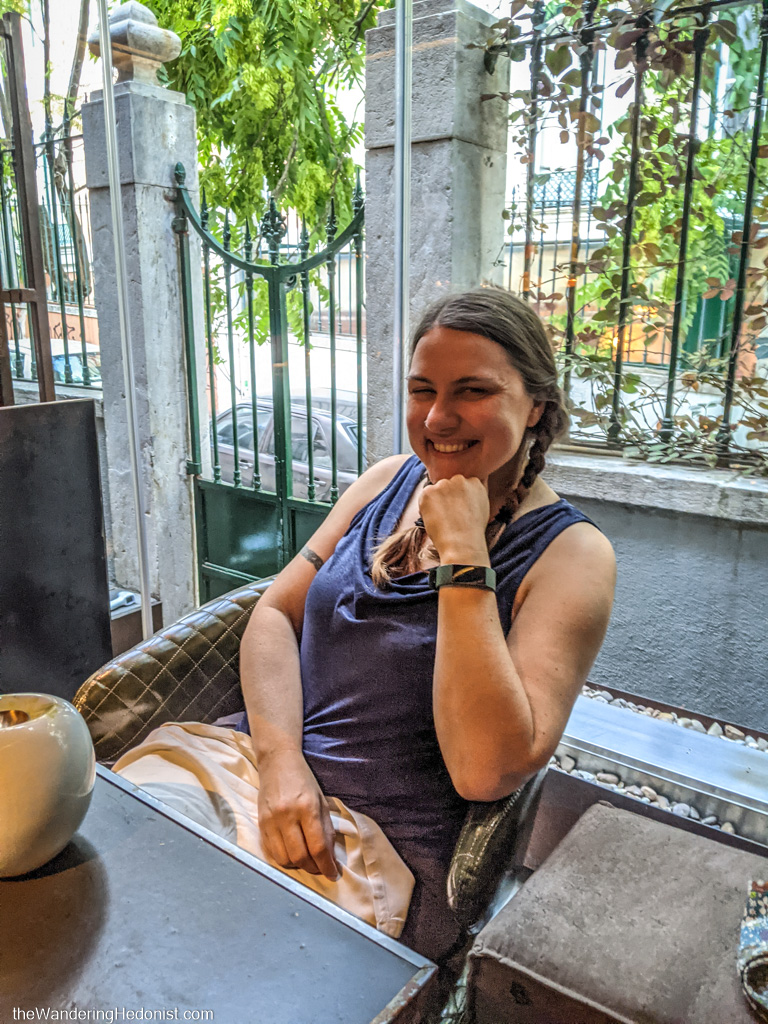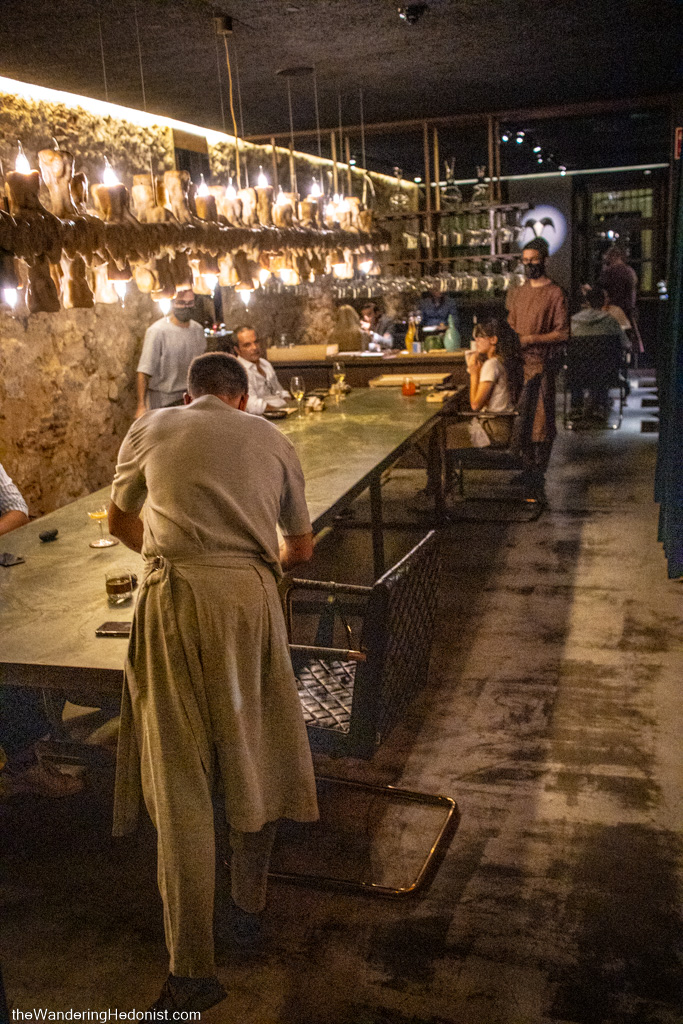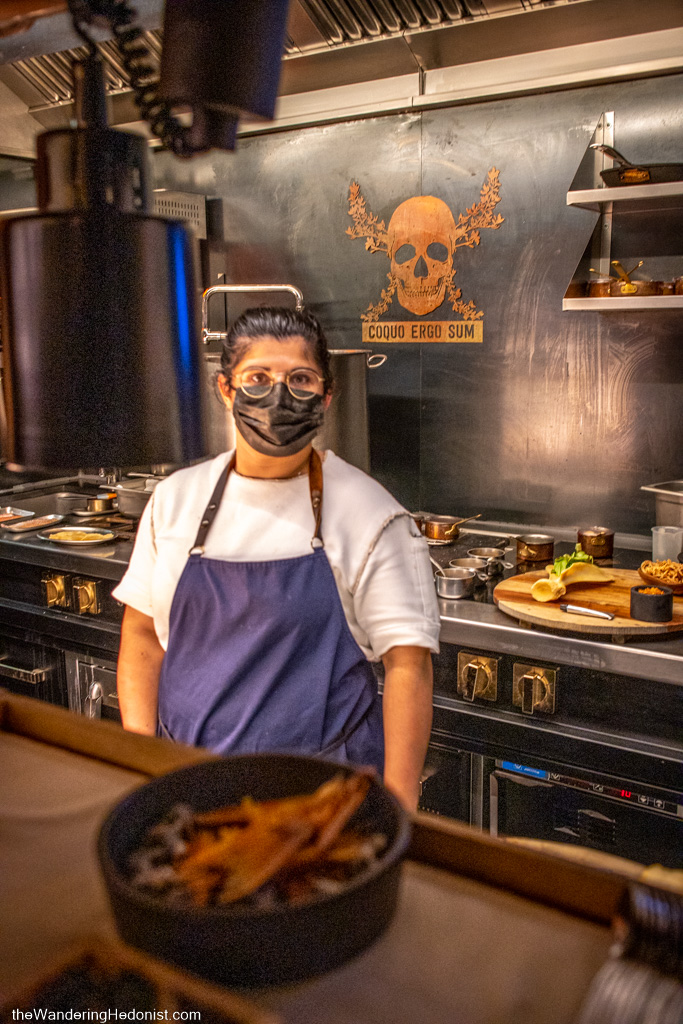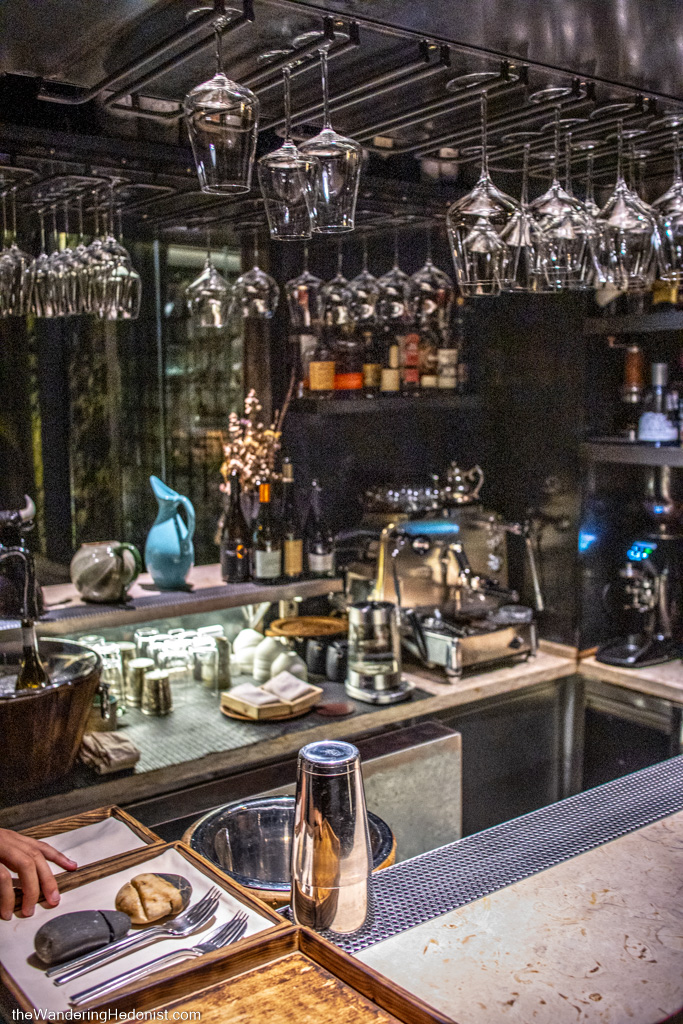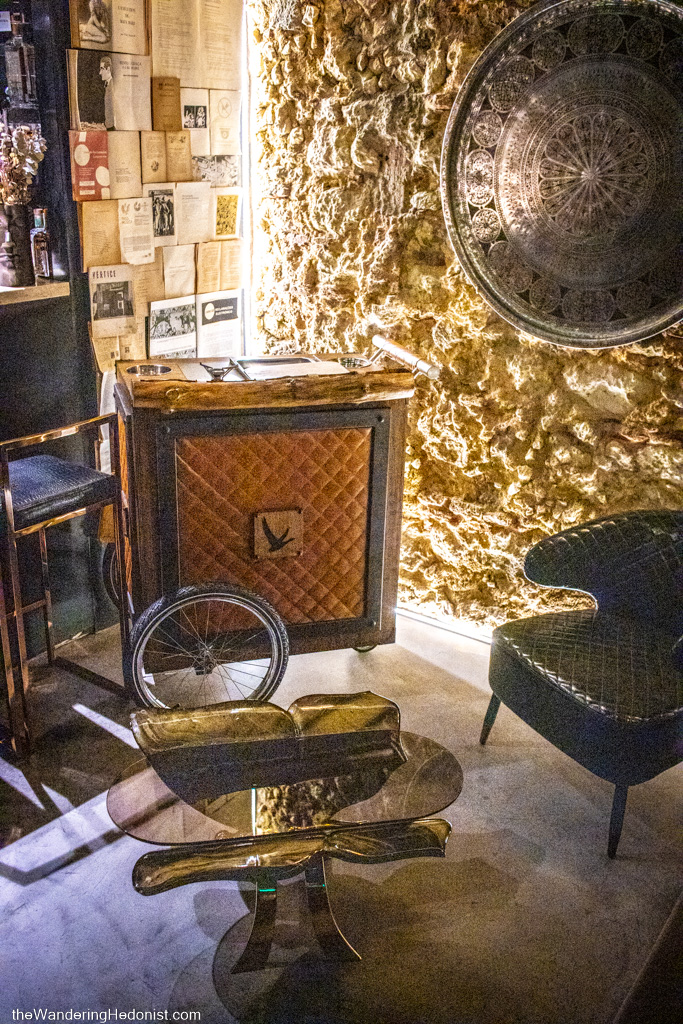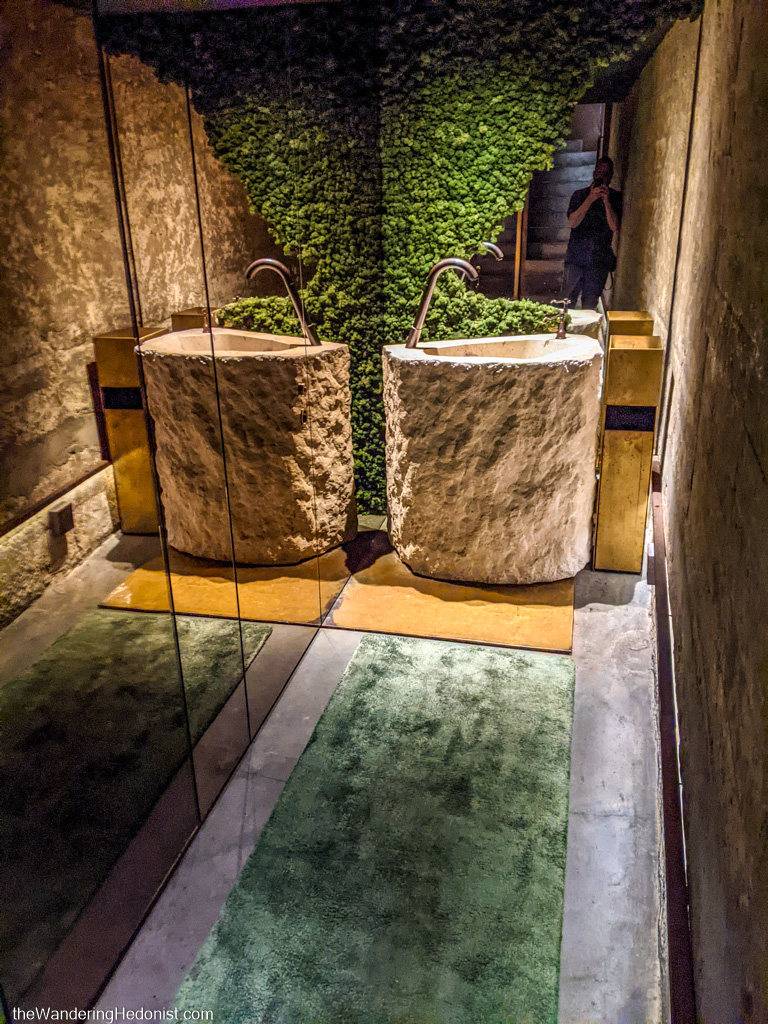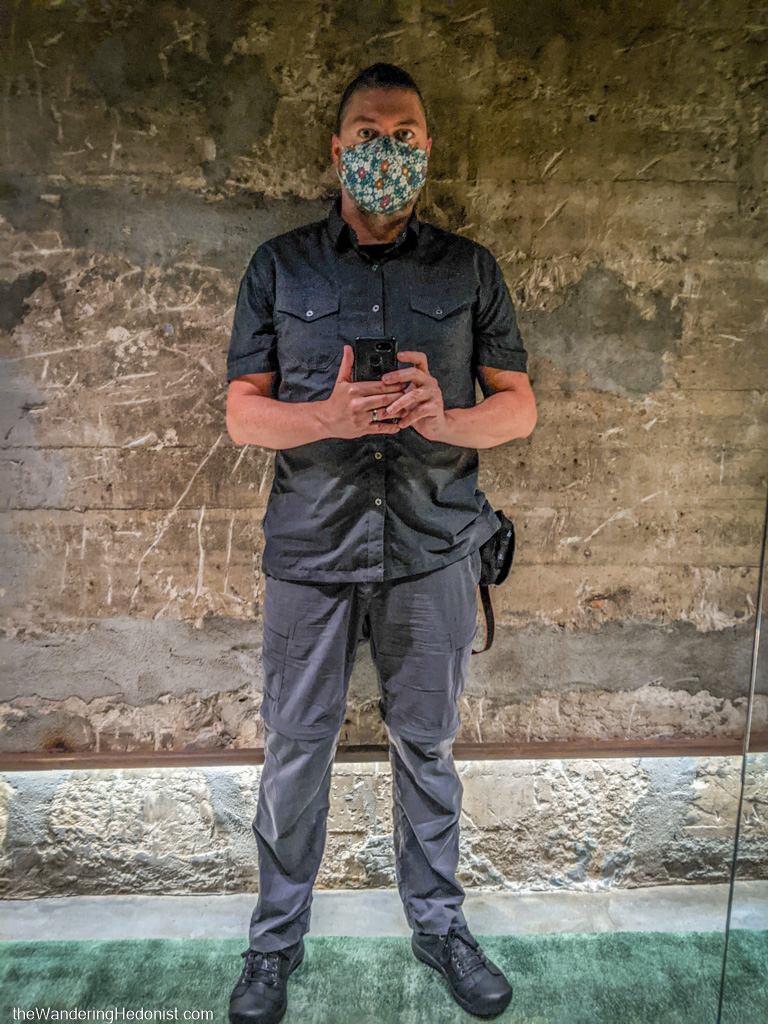100 Maneiras is the personal project of well known Lisbon chef Ljubomir Stanisic who immigrated to Portugal from Bosnia and Herzegovina as a young man. He is a well known local television personality as a juror on the Portuguese version of Top Chef, host for three seasons of the Portuguese version of Kitchen Nightmares, and currently hosting the Portuguese version of Hell’s Kitchen (the show that launched Gordan Ramsey as a tv personality). So you can imagine his reputation for temperament. Opened in 2009, 100 Maneiras is a rising star receiving its first Michelin star in 2020.
Arrival
The restaurant is located on a charming narrow street at the northern most section of Lisbon’s Bairro Alto neighborhood just northeast of the city’s historic Baixa center. Diners are met at the metal gates and undergo a covid screening with temperature check and hand sanitizer. At least for now you need to wait on the sidewalk until someone comes to greet you. We arrived in an Uber but you can take the 28 tram to the base of Bairro Alto and walk straight north.
The meal
100 Maneiras offers three tasting menus: The Story, the full 17 course menu at 125 euros, The Short Story, 8 selections from the main menu at 95 euros, and a vegan alternative for 110 euros.
The Story is an overt autobiographical expression of the chef’s early life in Sarajevo, Bosnia and Herzegovina, his experience living through the Yugoslavian civil war, and eventual resettlement in Lisbon and early cooking experiences. The course progression is structured like a book with a cover, foreword, chapters, and afterword. It’s a great device to set the timeline and bio elements.
The first course provides a bit more detail into the chef’s actual story but those elements quickly recede and the descriptions mostly involve the food elements, which you infer reference specific life experiences. You get a few anecdotes as the meal progresses but it would have been fun to hear or be provided with more detailed stories related to each course.
The meal is a marathon of delicious and interesting bites, both familiar, evoking traditional Bosnian dishes, and entirely new and exciting. There’s a delicate balance between the essential grandmother fare and the extremely precise and perfectly executed haute elements. Visually striking and creatively presented. I was seduced. Not only by the indulgent hedonism of the meal, but with the nostalgic pastoral childhood homages, the eclectic and precise details of the cutlery and service-ware (like the enormous bullhead water pitcher which kept making its way to the table), the layered ambiance of the room, and the contagious joyful service that encouraged curiosity and dialogue.
The meal was almost 5 hours in duration but the pacing was well thought through and I never felt like I was waiting or rushed, and the portions and richness were well balanced, so I did not feel like I was overly stuffed after so much food.
Sincerely one of my favorite meals and a terrific evening to boot. I highly encourage the experience.
COVER
Welcome to Bosnia
“Flower” bread, ajvar, kajmak, pasteta and sea “butter”.
(The first course centers around the chef’s mother’s bread that he named after her. Along with a few accompaniments key to his childhood. Ajvar and kajmak are ubiquitous condiments in Bosnia and pašteta or pate, was his favorite ingredient in UN rations he was given during the war.)
FOREWORDS
The next three courses were served together tasted in the order presented.
Orient Express
Shallot pickle, baba ganoush and papadum.
Feel the Beet
Smoked and pickled beet with dill mayo.
Mr. Potato Head
Fried potato, beef tartare, smântână and truffled egg.
Lucky Charm
Roasted broccoli, cashew emulsion, sorrel vinaigrette and avocado puree.
Sarajevo Cigar
Potato foam, smoked tea bread and duvan čvarci “tobacco”.
INTRODUCTION
Mixed Salad
Anchovies, truffle, parmesan and raspberry powder.
(This was an umami flavor bomb of a Caesar salad. A base of romaine heart topped with anchovies and truffle and a thick coating of shaved parmesan dusted with raspberry powder.)
1st CHAPTER
The Dark Knight
Cuttlefish, ginger and garlic.
Animal Farm
Pork, kohlrabi, rhubarb and basil.
Black Magic
Roasted onion, parsley and purslane chimichurri and recado negro beurre blanc.
2nd CHAPTER
Tea Party
Red mullet in smoked ham “tea”.
(The fish was excellent but the jamon “tea” broth made from roasted pork bones was fantastic.)
Miss Sarajevo
Scarlet shrimp sarma.
(Sarma is an omnipresent dish in the Balkans, usually with ground meat and rice wrapped with fermented cabbage leaves. Here, the chef uses scarlet shrimp native to Lisbon as the filling.)
The Last Supper
Cow head, horseradish, kupus and somun bread.
(This was the main meat course. Basically a taco that you assemble with Bosnian ingredients. The meat is stewed cow’s head, with fermented cabbage, horseradish instead of sour cream, and “tortillas” made from traditional somun bread. At this point I was pretty full and barely had room for the two tacos, though delicious.)
AFTERWORD
Foie pour toi
Foie gras, Dr. Bayard mint, “Mais Vale Tarde do Que Nunca” late harvest jelly yogurt and ras el hanout.
CONCLUSION
Ms. Nutalie Wood
Elderflower ice cream, strawberry and pine nut.
Crystal Ball
Uštipci, peach, geranium and sorrel.
(This was like a fresh warm donut filled with cold ice cream or mild sorbet with peach and a few geranium petals on the outside. Really interesting.)
Rock, Paper, Scissors
Fermented garlic, white chocolate and passion fruit.
(This was one of the courses the server had you guess what the flavors were. It tasted like rich congealed chicken stock. But it was black garlic paste. Very meaty flavor inside.)
A few final sweets
Baklava and other goodies reminiscent of Sarajevo.
Coffee
I opted for the Bosnian coffee. I was a huge fan while traveling through the area last year and drank a lot of it. Bosnian coffee is very similar to Turkish coffee with a few minor differences in the specific technique, though the type of bean used is the same.
The details
The small details are very important. And it was apparent that every nuance had been thought through. You could tell from the start that the meal was going to be thoughtful even before the food arrived. I really enjoyed the tableware which was long and thin with wooden handles and metal tips, though still well balanced. The water carafes were fun. I also enjoy cloth towels in the bathroom. The bathroom lock was interesting. I’ve only seen this style in Lisbon.
The restaurant
Inside, the space is narrow and long, broken up into three distinct dining areas: The Glass Room located in the front, the Dining Table, a long shared table in the middle of the restaurant, and the Back Room, with additional tables.
The kitchen and service is located across the right wall starting with an open assembly station overlooking the Glass Room and continuing down the length of the Dining Table room with a narrow open kitchen space. To the left of the assembly space between the Glass Room and the Dining Table is a small bar and small atmospheric lounge area with stairs leading down into the basement where the bathroom can be found and various cellar/storage spaces. The Back Room is separated from the Dining Table room with a counter partition and assemblage of hanging wine glasses. The bathrooms are along a long narrow hallway directly at the base of the stairs. The entire space is mirrored, walls and ceiling, a shared sink at the far end with two subtle doors cut out of the mirrored wall providing two unisex bathrooms which are also entirely mirrored including the ceilings with organic woodsy accents like branches and moss.
The Glass Room
The Glass Room is designed to feel like you’re outside. The front wall is all glass and the small courtyard out front is thick with vines and leaves. The motif is continued across the wall with printed curtains of moss designs and rough concrete. The 4 tables, 2 along each wall, share long custom couches printed with dark concrete patterns with wood and stitched green leather chairs opposite. A large root ball covered in moss diffuses the central recessed light and moss covers other portions of the walls. The space is very comfortable, the light is dim and ambient with spot lighting on the tables, and the soundtrack was a fun mix of spacey ambient and Bosnian inspired tunes. The color was a bit difficult to balance for an early reservation with the sun coming from one side and the warm artificial light from the other but manageable.
The Dining Table
Normally a communal table seating 12, the Dining Table was only seating two sets of couples at opposite ends for social distancing. A low long row of electric candles lights the space hanging over the table and the walls are textured with rough concrete.
The Back Room
The Back Room has more of a traditional dining room feel with nature motif continued with similar moss printed curtains across the walls.
Work spaces
Assembly area and kitchen, bar with lounge.
Downstairs
The downstairs was primarily the bathroom and mirrored hallway with sink.
